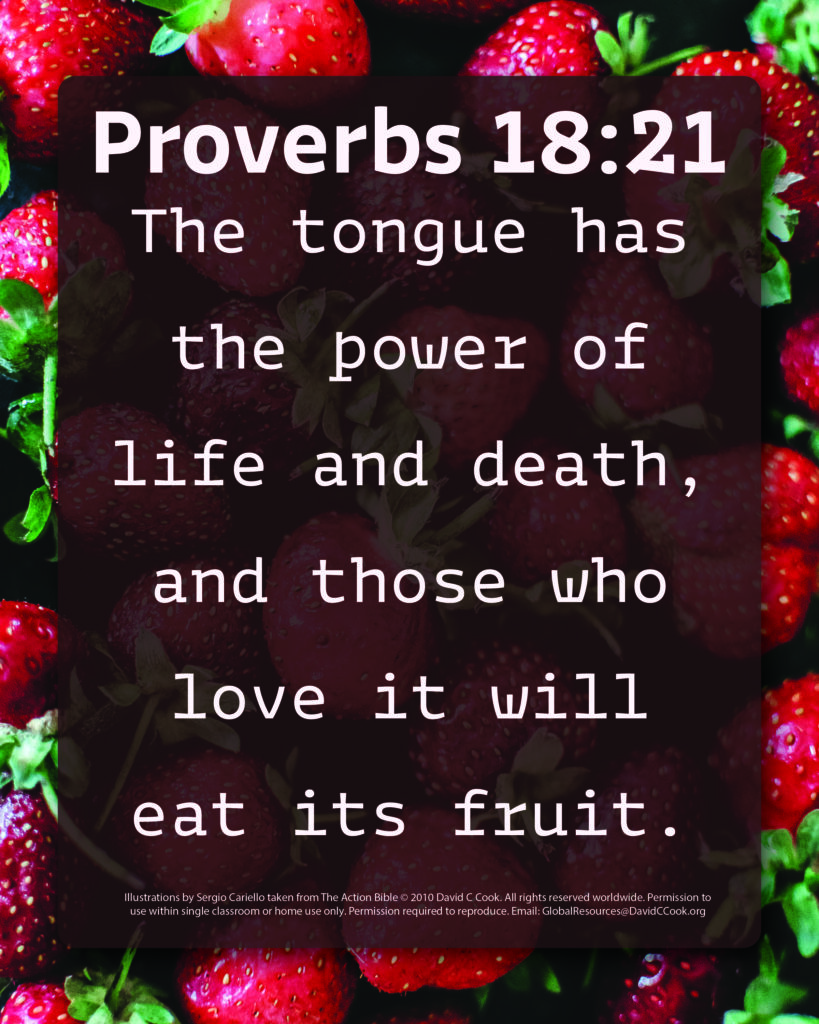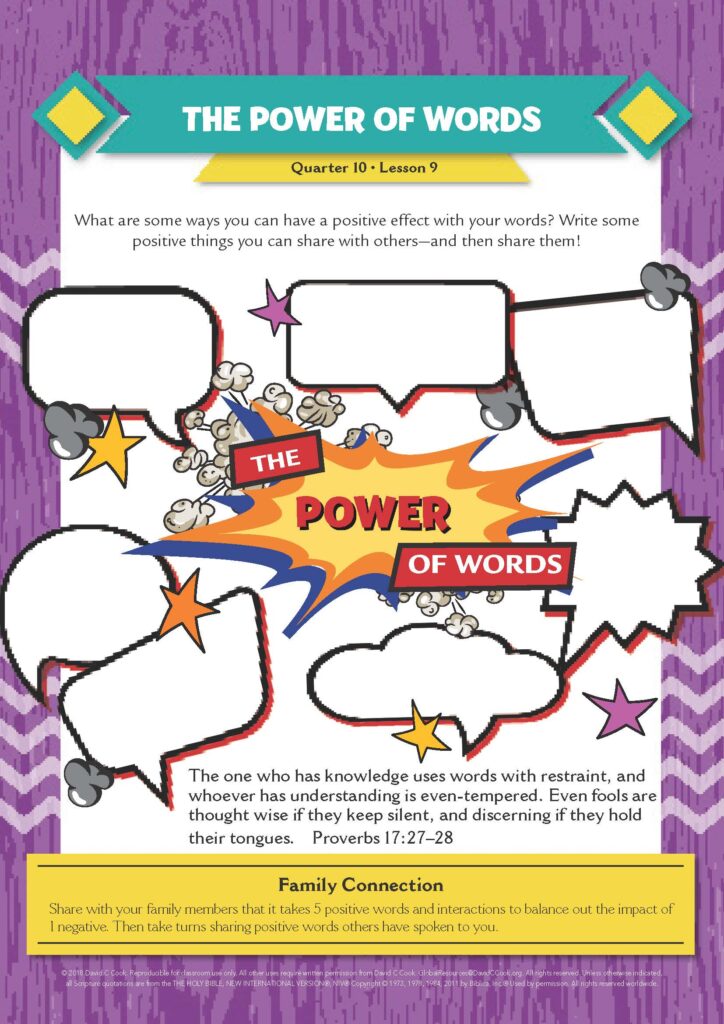During the lesson, the information for you to know is written in regular type, and what we suggest speaking or reading aloud to children is in bold. All resources for this lesson, including the Teacher Guide, Student Page, Family Connection Card, and other resources can be downloaded in a ZIP file by clicking on the following link:
In some lessons you will find "resource articles." These are articles written by experts from around the world to help equip you for your work with children and adolescents. Share them with parents or guardians if you consider it appropriate.
The tongue has the power of life and death, and those who love it will eat its fruit.
Proverbs 18:21
Words are powerful! With His words, God spoke the world into existence. He calls His own Son “the Word,” for it is in Jesus that God’s Word became flesh. And in His words and His life, Jesus revealed God to us in ways that only He could. We are created in God’s image. And, like our Creator, our words are powerful.
Experts say that it takes 5 positive words and interactions to balance out the impact of 1 negative word. Your words have the power to injure and the power to heal! How do you speak to the people closest to you—family members and friends? Do your positive words outweigh your negative ones? If not, what can you do to change that balance? Ask God to help you see where your words may be hurting others. Ask Him to give you the wisdom and self-control to speak words of life!
Encourage the students to share with their family members that it takes 5 positive words and interactions to balance out the impact of 1 negative one. Then they can take turns sharing positive words others have spoken to them.
Teacher Tip: If possible, email or text the Family Connection Card to the families of your students.
As teens arrive, greet them by name and ask, “Where do you think the strongest muscle in your body is located?” Allow them to share with you and with others in the class. (Do not tell them the answer yet.)
Your body has more than 640 muscles! The smallest is in the inner ear, and the largest is at the back of your legs. Your strongest muscle is located in your mouth, and it is called the masseter.
The masseter muscle works to keep your jaw closed. There is another powerful muscle in your mouth, too.
What do you think this other powerful muscle is?
Allow 2–3 students to share their ideas.
That powerful muscle is your tongue. What do you think makes your tongue powerful?
Students may suggest we use our tongues for important tasks, such as eating, drinking, and speaking.
Let’s do an activity to teach us more about this powerful muscle!
Divide students into groups of 3–4. Explain that you will gather 1 student from each group together. You will tell them a fact about animal tongues. Then they will repeat their facts to their groups while sticking out their tongues. The rest of the group must try to guess what they are saying. Then choose a new student from each group to repeat a fact while sticking out her tongue.
Pick a student from each group and quietly read them Fact 1. Be sure the other students cannot hear you. Send the students back to their groups. Once every group has guessed the fact, pick a different student from each group for Fact 2. Repeat until all 4 facts have been shared.
Gather the students for discussion.
Was it easy or hard to speak without using your tongue? Why do you think that is true?
How would your life be different if you could not use your tongue?
You use your tongue to speak, and the words you choose to speak have great power. Today we will learn how powerful your words can be.
The Bible tells us that words have great power. The Bible often uses the word “tongue” to represent the words we speak, since we use our tongues to form words.
Have a student read James 3:3–5 directly from a Bible. If that is not possible, the verses are printed here.
When we put bits into the mouths of horses to make them obey us, we can turn the whole animal. Or take ships as an example. Although they are so large and are driven by strong winds, they are steered by a very small rudder wherever the pilot wants to go. Likewise, the tongue is a small part of the body, but it makes great boasts. Consider what a great forest is set on fire by a small spark.
James 3:3–5
What 3 things do these verses compare our tongues to?
A bit in a horse’s mouth, a rudder on a ship, and a spark that starts a forest fire.
What do these verses teach us about the power of words?
Allow 2–3 students to share their thoughts. Do not correct them. They will learn more about the power of words during the lesson.
The Bible teaches us that our words have great power. They can be encouraging and helpful, or they can be hurtful and damaging. They can be sincere and truthful, or they can be dishonest and misleading. They can move us in a positive direction, or they can damage our reputations. They can help to make peace, or they can start trouble. We can and must choose how we use them.
Allow 2–3 students to share their thoughts on these questions.
Let’s read another Bible passage about the power of words. As we do, think about what kinds of words the passage might be talking about.
Have a student read Proverbs 25:11–13 aloud from the Bible.
Like apples of gold in settings of silver is a ruling rightly given. Like an earring of gold or an ornament of fine gold is the rebuke of a wise judge to a listening ear. Like a snow-cooled drink at harvest time is a trustworthy messenger to the one who sends him; he refreshes the spirit of his master.
Proverbs 25:11–13
What kinds of words does this passage tell us about?
Well-spoken words, helpful advice or criticism, and words that are truthfully and faithfully spoken.
Why do you think these kinds of words might be important?
This Bible passage teaches us that our words affect others. When we speak carefully and well, our words are like beautiful gold apples in a silver setting. They bring joy to others. When we share helpful criticism or advice, our words are like a gold ornament given as a gift. They help others.
Encouraging words, helpful criticism, polite words, truthful words, and words that express love and care can have a positive effect on others.
Listen to what the Bible tells us about using words positively.
Let your conversation be always full of grace, seasoned with salt, so that you may know how to answer everyone.
Colossians 4:6
What do you think it means that your speech should “always be full of grace?”
Gracious speech is polite and kind. It is encouraging and positive. It is truthful and sincere. It makes people feel good about themselves. It shows that you care about the other person, even when the thing you are saying may be hard to hear.
Turn to someone next to you and say something gracious to that person.
Pause for a minute to allow the students to do this.
As you can see, our words also affect the opinions others have of us. The words we use, the ways we say them, and the kinds of things we choose to talk about can cause others to have positive or negative ideas about who we are. For example, when we speak truthfully and faithfully, like the messenger in the Bible passage we read earlier, we refresh those around us. And when we say something kind or encouraging to others sitting next to us in class, the people who hear our words will see us as kind and encouraging.
Gossip, lies, unkind words, and untruthful words can have a negative effect on others. And they can also have a negative effect on the opinions others have of us. Listen to what the Bible tells us about the effects our words can have.
Do not let any unwholesome talk come out of your mouths, but only what is helpful for building others up according to their needs, that it may benefit those who listen.
Ephesians 4:29
What do you think “unwholesome talk” is?
Any kind of talk that causes others to make poor choices or is intended to hurt others. This may include foul language, lies, gossip, unkindness, verbal abuse, or other negative kinds of words.
What kind of talk “is helpful for building others up according to their needs?”
Encouragement, helpful criticism or advice, and other positive language that helps others to grow and learn. It should be delivered in a way that fits the occasion. For example, in a professional setting, speech should be polite, formal, and professional, while a person can be friendly and informal with friends.
Choosing when to speak and when not to speak is also important. We need to know when to speak and when to stay silent. Some situations are best handled by listening before responding—or by not saying anything at all. Listen to what the Bible tells us about this.
The one who has knowledge uses words with restraint, and whoever has understanding is even-tempered. Even fools are thought wise if they keep silent, and discerning if they hold their tongues.
Proverbs 17:27–28
Remember at the beginning of class when we talked about the most powerful muscle in our bodies? It is the masseter muscle, which keeps our mouths shut. Though our tongues are powerful, our masseter muscles are even more powerful. We can choose not to speak. And sometimes that is the wisest and best choice.
In many situations, it is best to stay silent. If you are going to make the situation worse, if you are tempted to say something unkind or inappropriate, or if what you say may encourage someone else to do or say something wrong or sinful, it is best to stay silent.
Now that we’ve learned about the power our words have, let’s practice using words that have a positive effect on others and that encourage others to form good opinions of us.
Have the students find partners. The pairs should be spread out so they have enough space to do their role-plays. Pause after each situation for pairs to act it out.
When pairs have finished role-playing the situations, gather the class together.
What is 1 thing you learned today that you think will help you when you speak to others?
What is something you learned that you want to remember a year from now?
Have students turn to others near them and share their answers. Then call on 3–4 teens to share their answers with the class.
If you are using the Memory Verse Poster, show it to the students.
The tongue has the power of life and death, and those who love it will eat its fruit.
Proverbs 18:21

Optional: If you are using the Student Pages, give the teens time to complete their pages.

Close with a blessing based on James 3:4:
Blessing: May your tongue steer you toward all the good things God has planned for you! And may your words bring life to others and yourself.
Lead the teens in singing this quarter’s song, if possible.
Life on Life ©2020 David C Cook. Reproducible for home or classroom use only. All other uses require written permission from David C Cook [email protected]. All rights reserved.